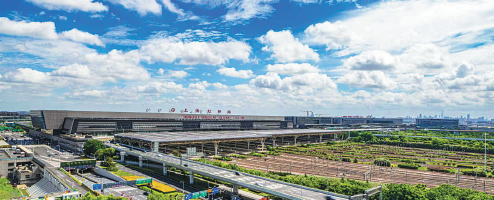

The Shanghai Hongqiao International Central Business District has made great strides in improving its business environment over the last 18 months. CHINA DAILY
Construction of 35 new projects worth almost 36 billion yuan began this year, says Party secretary
The Shanghai Hongqiao International Central Business District or Hongqiao International CBD, one of the business hubs in the Yangtze River Delta region, stands out in its appeal to global investors for its vast growth potential despite the COVID-19 outbreak which slowed down the economic growth of Shanghai in the first half of 2022.
In the first eight months of this year, 120 flagship projects with a total investment of 82.72 billion yuan ($11.84 billion), representing a year-on-year increase of 60 percent, were secured by the Hongqiao International CBD. The construction of 35 new projects valued at 35.89 billion yuan also began, according to Bao Bingzhang, Party secretary of the administrative committee of the Hongqiao International CBD.
Impressive achievements
The Hongqiao International CBD has taken measures to invite trade companies and private enterprises to set up headquarters in the area over the past 18 months.
From January to August, 30 trade companies from sectors such as cross-border e-commerce, offshore trade, bonded exhibition and digital products trade, and 25 private companies including Midea, Kindly Group and Glodon Company have chosen to set up headquarters in the CBD.
So far, the CBD boasts about 500 headquarters of various enterprises. A total of 43 multinational companies including Unilever and Tyson have established regional headquarters in the Hongqiao International CBD.
By the end of August, there were nearly 4,000 trade companies and more than 60,000 private companies in the region, said Gu Jun, director of the Shanghai Commission of Commerce.
The CBD has the National Exhibition and Convention Center (Shanghai), which is the permanent venue for the annual China International Import Expo. It takes advantage of the CIIE and its spillover effect to become an import product trading hub.
It has created several platforms to serve the demands of business for talent, finance, information and technology. It has constructed the Hongqiao Import Commodity Exhibition and Trading Center for global traders to display and sell their products not only during the six-day CIIE, but all year long.
The second phase of the center, which started operation in July, has attracted more than 200 suppliers and more than 2,000 brands from more than 90 countries and regions.
More than 70 percent of products sold in the second phase are connected to the CIIE.The Greenland Global Commodity Trading Hub, also known as G-Hub, is another year-round CIIE products trading platform, and has attracted 180 enterprises and organizations from 76 countries and regions.
The Hongqiao International CBD has become a promising district given an array of supportive policies for enterprises to turn their dreams into a thriving reality.
According to Bao, the State Council released a framework plan and 29 policies in February last year to build Shanghai's Hongqiao area, which contains the Hongqiao International CBD, and parts of neighboring Jiangsu and Zhejiang provinces, into an international opening-up hub to bridge the domestic and international markets.
The Shanghai government then announced in March last year the upgrade of the CBD along with 20 supportive policies. So far, the Hongqiao International CBD has implemented 26 of the 29 policies approved by the central government and is ramping up efforts to implement the 20 policies released by the Shanghai government, according to Bao.
"The CBD will continue to promote policies and institutional innovations, as well as develop mid and long term development plans to unlock more growth potential," said Bao.
Embracing more opportunities
The Hongqiao International CBD is stepping up to contribute to the industrial upgrade of Shanghai in the next three years.
According to a development plan released by the Hongqiao International CBD on Sept 14, it will continue to spur development of the headquarters economy, the exhibition industry, the trade economy and the professional service industry. It also mapped out five new frontiers for future development, which are the digital economy, bioscience, low-carbon and new energy, smart vehicles and consumption industries.
By 2025, the CBD will be home to four industrial clusters with an annual industrial output value of 100 billion yuan, three industrial clusters with an annual industrial output value of 50 billion yuan and 1,000 headquarters of global companies, according to the plan.
The construction of the Online New Economy Ecological Park within the Hongqiao International CBD began on Sept 14, marking a new milestone of the CBD in seizing emerging business opportunities.
The ecological park, with a planned land area of 16.18 square kilometers, will have about 14.64 sq km of business space. So far, about 11 sq km of business space is ready to receive investors.
Based on the construction plan, the ecological park will serve six sectors in the next three years. They are digital trade, digital exhibitions, digital content production, digital health, industrial internet and digital travel.
The construction of 20 key projects has begun, including an online platform for imported products, Metaverse Enterprise Center, InnoMatch Global Technology Online Matchmaking Platform, Shanghai International NCC & E-sports Center, Ctrip Smart Travel Industrial Park, iFlytek Artificial Intelligence Industrial Park, an industrial cluster of smart vehicles, an innovation incubation platform and Beidou Starry Sky Information Industrial Base. Those projects will develop the CBD into a digital hub in the Yangtze River Delta region and get it off to a flying start.
The ecological park also attaches greater importance to developing four frontier industries in the metaverse, quantum information, big data and aerospace information to build the CBD into a global digital trading hub, a national digital service export base and a digital economy innovation center.
By 2025, the park will be home to more than 50 leading digital enterprises and 200 growing digital enterprises. Its industrial output value will exceed 500 billion yuan.
Efforts will also be made to promote innovation and new digital technology applications. There will be more than 50 application scenarios created to support development of the digital economy.
Two leading research institutes and two jointly established labs will be set up to support the park to be a pacesetter in the digital development sector in the Yangtze River Delta region. The CBD is also set to be a digital product manufacturing and trade center with global influence.
By the end of 2021, the Hongqiao International CBD was home to more than 2,200 digital businesses, which set a solid foundation for the area to achieve better development.
A brighter future
With the aim of making the Hongqiao International CBD greater strides in developing the headquarters economy, especially the headquarters of trading companies, the Shanghai government released 25 new measures on Sept 14 to provide enterprises with more talent services, finance and global expansion support.
The CBD also launched the Hongqiao International Business Partner Initiative on Sept 14 to partner with 36 leading enterprises and institutions including KPMG and Manpower Group with the aim of improving its service standards in the sectors of professional services, international trade, industrial cluster development and international financial investment.
"The development of the Hongqiao International CBD is very important because it is the first stop in the Yangtze River Delta region," Zeng Xiwen, vice-president of Unilever, said in a video clip broadcast on Sept 14. "We will bring more investment, management functions and research and development to China. We will rely on the development of Hongqiao and grow with it."
The Hongqiao International CBD is building new facilities to better combine businesses and the life of its people. The Qianwan area of the Hongqiao International CBD, with a planned area of 30 sq km, is designed to be a hub for biomedicine, culture and entertainment and the digital economy. It is currently under construction.
The transit-oriented development model, or TOD, which highlights integration of mixed land use as well as transportation, will be applied in the Qianwan area.
A world-class waterfront park and public facilities such as an art center, a sports center and a cultural promotion center will also be built for the leisure needs of people.